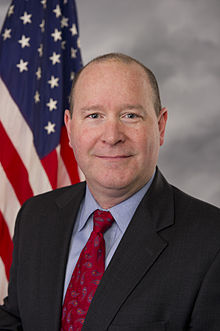The Financial CHOICE Act will replace the failed Dodd-Frank Act with reforms that will deliver:
- MORE ACCOUNTABILITY
Protecting consumers and growing our economy requires accountability from both Washington and Wall Street. That’s why accountability is at the heart of the Financial CHOICE Act. It imposes the toughest penalties in history for financial fraud, it puts Washington’s financial regulators on budget, and requires rules to pass a cost-benefit test and holds them accountable to Congress for major regulations.
- NO MORE BAILOUTS
Dodd-Frank did not end “too big to fail.” Hardworking taxpayers still remain on the hook for Wall Street risk-taking thanks to Dodd-Frank’s bailout fund.
The Financial CHOICE Act ends bank bailouts and “too big to fail” once and for all. There will be bankruptcy — not taxpayer-funded bailouts — for financial firms that fail. A “no more bailouts” policy also lays the foundation for a more resilient, stable financial system that creates economic opportunity for all Americans.
- MORE ECONOMIC GROWTH, MORE JOBS AND A MORE RELIABLE FINANCIAL SYSTEM
Dodd-Frank’s excessive regulatory complexity has produced a less resilient financial system and stifled economic growth.
By reducing obstacles to credit and capital, the Financial CHOICE Act strengthens our financial system and promotes a dynamic economy with more jobs, higher wages and faster growth. These reforms “will allow the private sector to fuel economic growth in our 21st century economy,” the Small Business Investor Alliance said.
- MORE CHOICES FOR CONSUMERS
The “regulatory taxes” imposed by Dodd-Frank are passed on to consumers in the form of increased fees, fewer products and services, and more limited credit options. For example, since Dodd-Frank became law, the share of banks offering free checking accounts has fallen by almost half.
The Financial CHOICE Act gives consumers more choices and options when it comes to credit, providing access to products and services they want and need. Consumers must be vigorously protected not only from fraud and deception, but also from the loss of economic opportunity and freedom.
HELP FOR SMALL BUSINESS, AMERICA’S JOB CREATING ENGINE
Even President Obama’s Small Business Administration director admitted Dodd-Frank’s regulations hurt small business lending. “Small banks have been laden with excessive costs and confusion from overlapping regulations, which are getting in the way of their ability to make small business loans,” she said.
The Financial CHOICE Act includes numerous provisions — many of them strongly bipartisan — to eliminate unnecessary regulations in order to provide small businesses, start-ups, and entrepreneurs greater freedom to innovate, grow their businesses, and create jobs in our communities.
- MORE CERTAINTY SO WORKING AMERICANS CAN PLAN THEIR FINANCIAL FUTURES
The best way for the Federal Reserve to help the economy is by adopting a transparent, strategy-based policy strategy that will provide more predictability for the American people. But currently, the Fed’s so-called “forward guidance” is vague and leaves hardworking taxpayers uncertain as they attempt to plan their financial futures.
By promoting a more predictable and transparent rules-based monetary policy, the Financial CHOICE Act provides a stronger foundation for economic growth than the Fed’s improvisational approach of recent years.
A MORE LEVEL PLAYING FIELD
Dodd-Frank didn’t end “too big to fail,” but it did create “too small to succeed.” Unlike big banks, community banks can’t afford the armies of lawyers and compliance officers it takes to sort through Dodd-Frank’s red tape. This creates an uneven playing field. Since Dodd-Frank became law the big banks are bigger and the small banks are fewer. The Financial CHOICE Act provides desperately needed regulatory relief for Main Street banks and credit unions. This will help level the playing field and allow community financial institutions to devote more time and resources to meeting customer needs and free up resources for lending.
- MORE SAVINGS FOR WORKING AMERICANS
The Department of Labor’s Fiduciary Rule will cost working Americans billions of dollars in lost retirement savings. The Financial CHOICE Act repeals this misguided, unnecessary, and excessively complex regulation that makes it harder for working Americans to save and invest for retirement, college, and their future.
- MORE FINANCIAL OPTIONS
There are numerous provisions in Dodd-Frank touted as “investor protections” that actually increase costs, including rules that force companies to waste money on burdensome requirements rather than using that money to grow, thrive and create jobs.
The Financial CHOICE Act will amend and eliminate provisions that restrict financial opportunity and investment options for hardworking Americans and make it harder for businesses to create good-paying jobs.
- A MORE ACCOUNTABLE AND TRANSPARENT FED
Despite its failures during the run-up to the financial crisis, the Federal Reserve gained extraordinary new powers thanks to Dodd-Frank but no corresponding increase in its transparency or accountability to the American people.
The Financial CHOICE Act protects the Fed’s independence when it comes to the conduct of monetary policy, but demands greater oversight, accountability and transparency at the nation’s central bank. For example, the Financial CHOICE Act requires an audit of all aspects of Federal Reserve operations — not just those that the Fed wants us to see. This is a necessary antidote to the secrecy and lack of transparency that have characterized the Fed for far too long.
This information was compiled by the House Financial Services Committee and can be access on the committee’s website here: https://goo.gl/vQDzJw.
|



